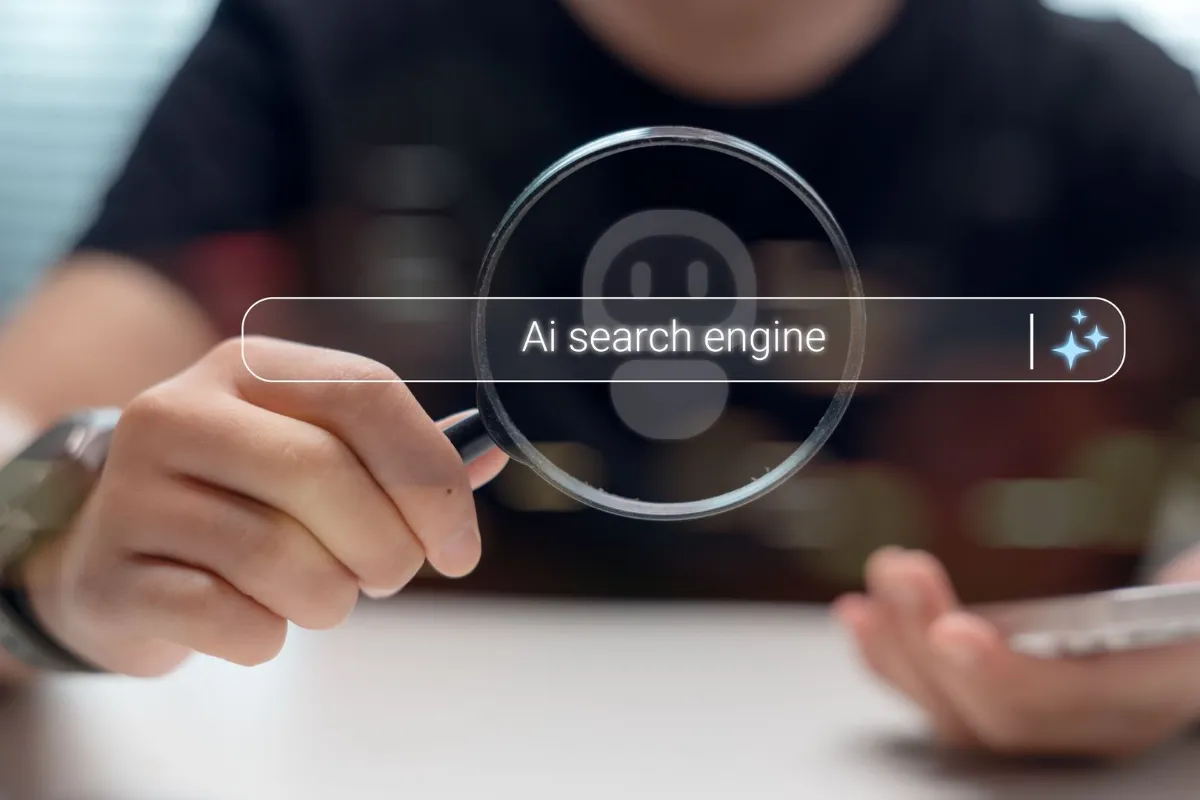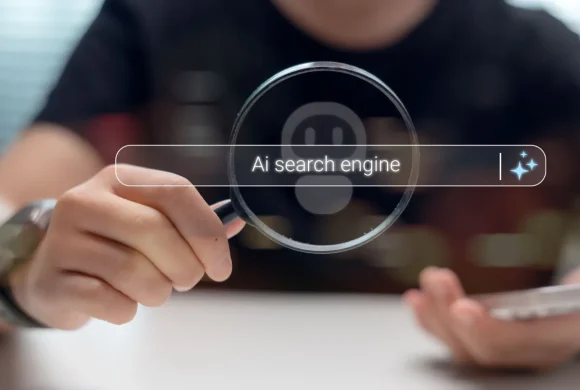What is going on with AI search?

What is going on with AI search? I am being asked this question more and more by all stakeholders, not just clients. The technical and creative team here at Brilliant Digital is also hunting down as much information as possible while analysing trends and shifts that seem to pop up daily.
The subject has dominated Deb’s desk for the past 12 months, and I will undoubtedly continue to present commentary and thought on how AI shapes digital marketing for the foreseeable future. While AI’s influence will continue to grow and develop, this is an opportune time to put aside all the technical terms and acronyms used to make it sound so high-brow and provide insights into what is changing and how we adapt to keep our clients ahead.
From the best solution to a problem to the best solution in the market
The focus on how we set up a digital marketing “system” is always on providing solutions. For the B2B market, this is a top-tier priority for search and winning business. Past strategies centred on establishing clients as the best solution to a problem, for example, 3D printing, fire safety installations and compliance, business accounting and investments, or civil and mechanical engineering.
The shift is now on establishing the same business as the best solution to the problem in the market. It is a significant change, and our role is to educate AI search engines on why our client is the best in the market at what they do, not just ensure they’re part of a list of businesses that can solve a user’s problem.
“Our role is to teach the AI who the client is, what they offer, and why they’re the best option in the market.”
We’ve had a structured set of rules - now we are making the rules
Google has been and still is one of the best innovations of our time. It offers the gold standard in sorting and presenting information digitally and has revolutionised how humans live. This still holds today, and Google is the blueprint for how AI search works. For the past few decades, marketing agencies such as Brilliant Digital have chased keywords and Google ranking for their clients. There is a set of rules that made the process fair and equitable, and Google set the playing field. Google was the teacher, marketing agencies were the students, and clients were the subject matter.
The big challenge now is that AI is becoming increasingly popular with users. However, compared to Google, it is still in its infancy and relies heavily on being trained. Our role is to teach the AI who the client is, what they offer, and why they’re the best option in the market, not just the best solution to the problem.
So, how do we do this? Many clients know we’ve been doing more than tweaking their websites and content. We have systematically reestablished their digital presence to “train” AI search engines. The AI learns everything about a business from what it finds online: the website, content, reviews, social media, case studies, news articles, and blogs. Like a curious child, it takes on board everything it can digest and will form answers to user questions using three primary tools.
- The AI will check live search results and recent content. Is your business actively publishing helpful information, and are people talking about you?
- They check what is factual. Does your business have a well-defined business profile? Is your business name, products or services, location and industry consistent across all verifiable platforms? Having redundant or out-of-date information on your website or digital collateral will work against you.
- AI language models. Is your content conversational? This is a big one. Your content must be conversational in tone and answer questions. Including FAQs the AI can draw on is not a luxury; it is essential to training the AI.
Our role as digital marketers is to provide clarity. Content must be clear, concise and conversational and meet each above without compromise. A lot of “Cs”
“Each blog, review, or social post influences how AI perceives you—it’s an ongoing process of education and credibility building.”
Educating AI: the three pillars
In previous articles, I’ve discussed the need to keep human hands on the content steering wheel. As the AI evolves and actively learns from what we teach it, human influence becomes more critical. The AI learns from three key pillars.
What it can understand. AI machines must understand who you are and what you do. When ambiguity infiltrates your brand, the AI cannot determine your purpose. As mentioned above, your foundation details, name, products and services, locations, and target audiences must be accurate, well-defined and consistent everywhere, including social media, downloaded product or service lists, online capability statements, blogs, news articles, website content and the schema markup. You must make it easy for the AI to understand who you are and what you offer.
Credibility is mandatory. You need to prove to AI and, by osmosis, your potential customers that you are the best market solution. Quality content and consistent thought leadership are the keys here. Case studies, client reviews, opinion pieces, conversational blogs, and testimonials build trustworthiness and authority, filling the knowledge graph.
Delivering your content the AI way. Have your content in the right place in a format that AI can use. FAQs are ideal for voice assistance AI, while search engines crave well-structured articles. You need to hit both. Ensure your website is fast-loading, mobile-friendly, and properly structured. It is about being present when a customer asks questions or types a query, whether in Google or an AI bot. By meeting these three pillars, you’re effectively,
- Educating the AI system
- Building algorithmic trust
- Positioning your brand as the go-to answer
Each blog article, social media post, content upgrade, press article, etc., about your business influences how AI perceives you. SMEs require an integrated content strategy covering the technical aspects and content marketing supporting these pillars while educating AI and customers. It is an ongoing discovery, and with our help, we can ensure your business remains the solution leader in your market.
In my next article, I’ll discuss the “Conversational Acquistion Funnel,” essentially the modern AI version of a sales funnel and critical knowledge for any SME owner.
Until then, thanks for reading.

About Deb
Meet the author
Deb Croucher is the founder of Brilliant Digital. She works directly with SME owners to create strategy-led, full-service marketing that delivers, not just in Google, but in the new world of AI-powered discovery.

Let’s Grow Your Business Together
Key Takeaways
FAQs
What is changing in AI search compared to traditional search engines like Google?
AI search doesn’t just look for the best solution to a problem, it aims to identify the best solution in the market. Unlike Google, which follows a structured set of rules, AI learns dynamically from online information, requiring businesses to train it actively.
Why is AI search becoming such a big topic in digital marketing?
AI search is reshaping how businesses are found online. With its ability to learn from live search results, factual information, and conversational content, AI changes how potential customers are matched with providers. This makes digital visibility and credibility more critical than ever.
How does AI learn about a business?
AI learns by consuming everything it can find: websites, blogs, reviews, social media, press coverage, etc. If the information is outdated, inconsistent, or unclear, AI won’t fully understand the business, which can reduce its visibility in search results.
What are the three key pillars of educating AI?
The pillars are:
- Clarity: making it easy for AI to understand who you are and what you do.
- Credibility: demonstrating you are the best in the market through case studies, testimonials, and thought leadership.
- Content delivery: ensuring information is structured, accessible, and available in the formats AI can use.
How do outdated details harm AI search visibility?
AI becomes uncertain if a business has inconsistent or redundant information, such as old addresses, mismatched product descriptions, or incorrect industry tags. This ambiguity means your business is less likely to be recommended as the leading solution.
What role does content strategy play in AI-driven search?
An integrated content strategy ensures your brand consistently educates both AI and customers. From blogs and press releases to social media and FAQs, each piece of content adds weight to how AI perceives your business and whether it recommends you.
How can SMEs stay competitive in the age of AI search?
SMEs must publish helpful, consistent, and credible content across all digital platforms. Building authority through reviews, case studies, and educational articles helps position smaller businesses as trustworthy and competitive against larger players.
How does Brilliant Digital help SMEs adapt to AI search?
Brilliant Digital systematically rebuilds and strengthens a business’s digital presence so AI can clearly learn who it is, what it offers, and why it is the best in its market. This includes website upgrades, structured content strategies, and ensuring accuracy across all platforms.
Why should SMEs partner with Brilliant Digital now?
As AI rapidly shapes search behaviour, SMEs cannot afford to fall behind. Brilliant Digital provides the expertise to keep businesses visible, credible, and competitive by creating integrated strategies that educate AI while attracting real customers.










